'Wrong time' for Christian convention as trade hit
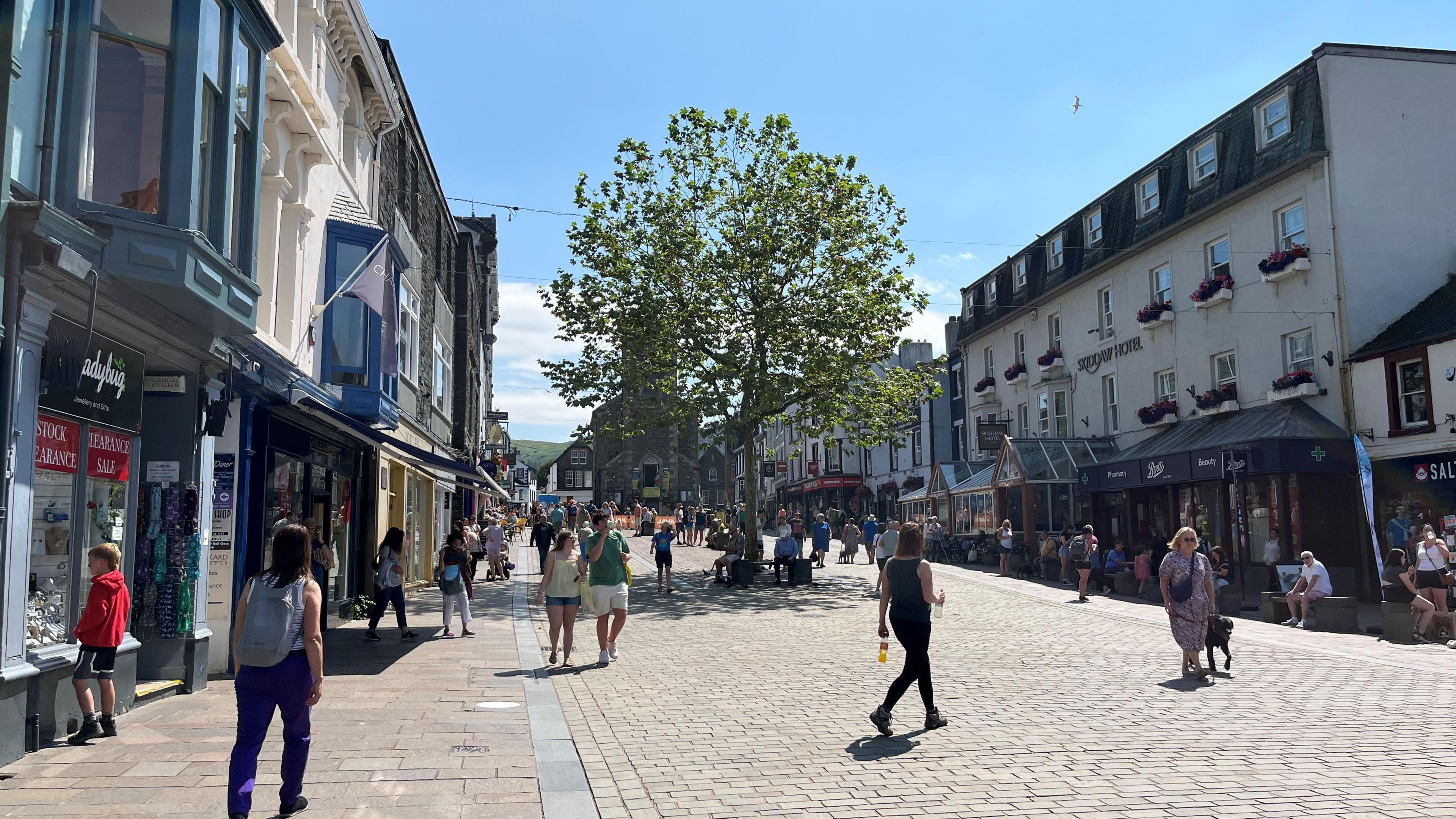
Some residents and business owners say Keswick shops, pubs and cafes see a downturn in trade during the Christian convention
- Published
For 149 years, a Lake District town has played host to a Christian convention that has grown from a small affair in a vicar's garden to a big annual gathering, drawing crowds from all over the world.
Keswick Convention now takes place over three weeks in the summer and this year attracted 13,000 visitors - more than double the town's population - according to its organisers, Keswick Ministries.
But while the B&Bs and hotels are booked a year in advance for the whole period, other businesses in the town say the convention has a negative impact on trade.
It is an uncomfortable conversation to have, townsfolk say, but it's not the only difficult situation Keswick finds itself in during the convention.
Anti-abortion groups make approaches residents say are upsetting and preachers spread "misogynistic" messages in the town - from both of which convention organisers have distanced themselves.
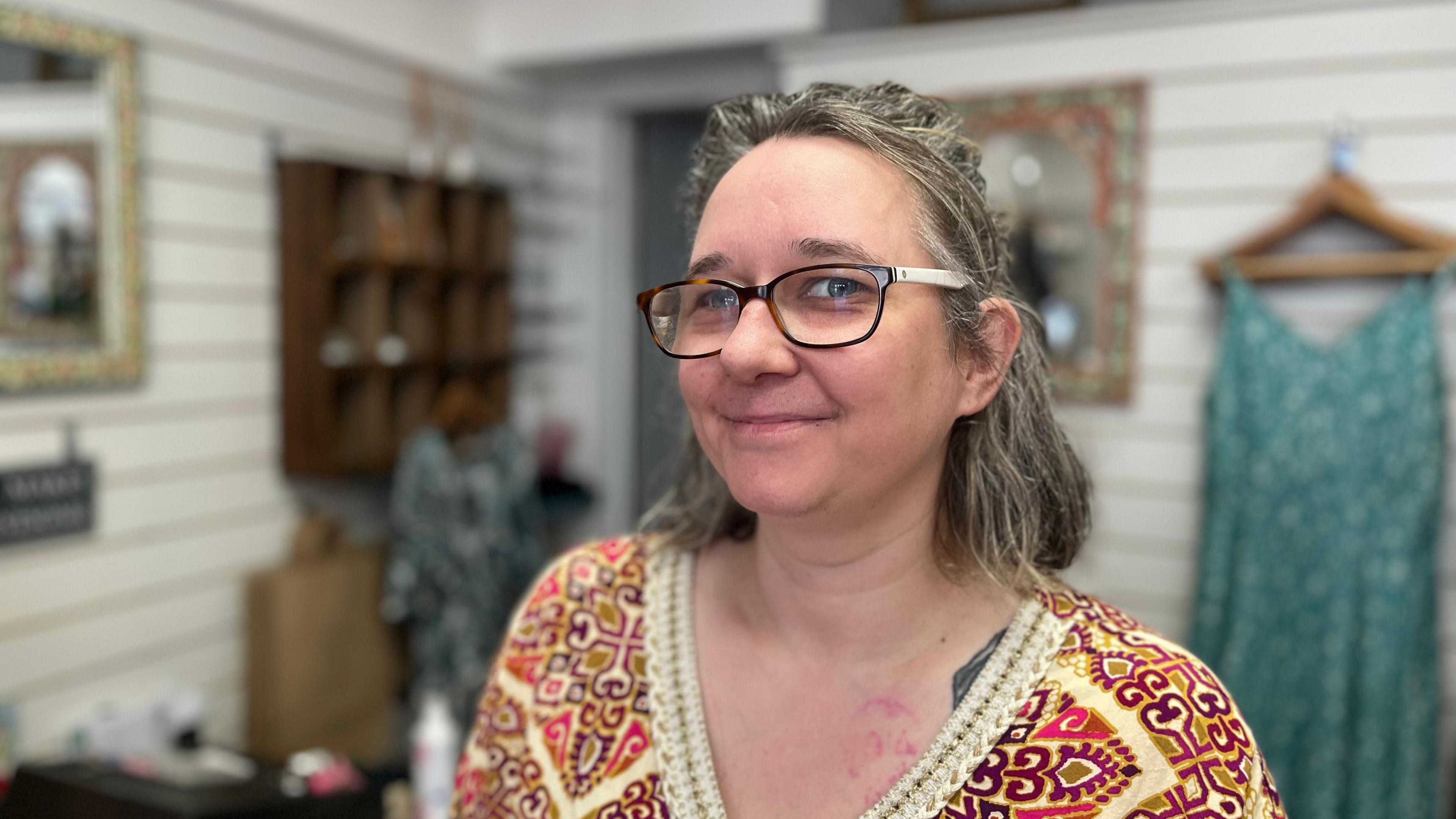
Vicky Kelly says the gift shop where she works sees a 30% downturn during the convention
While cafes and shops would ordinarily see a steady stream of visitors throughout the day, there are intermittent surges in footfall before and after the convention events, businesses say.
"We've lost about 30% of our business year-on-year just in those particular three weeks," says Vicky Kelly, who works in a gift shop in Keswick.
"The convention used to only have a two-week slot, so we've actually got some really good data where we can compare it and we can see the difference that the extra week has made."
Keswick Ministries says many shops shared with them "their experience of boosted sales" during the convention and say that it is not just Keswick that benefits from the event, but the whole area, with many attendees choosing out-of-town accommodation.
Empty pubs
But some businesses wonder if July is the right time for the event.
Viki Mallaghan, a resident and business owner, says she notices pubs and outdoor shops often empty during the convention weeks.
"The winters are very long and summer is the time businesses can make up for that so to have most of the convention right in the school holidays impacts on them," she said.
"They just aren't as busy because the people that are here, are here for the convention."
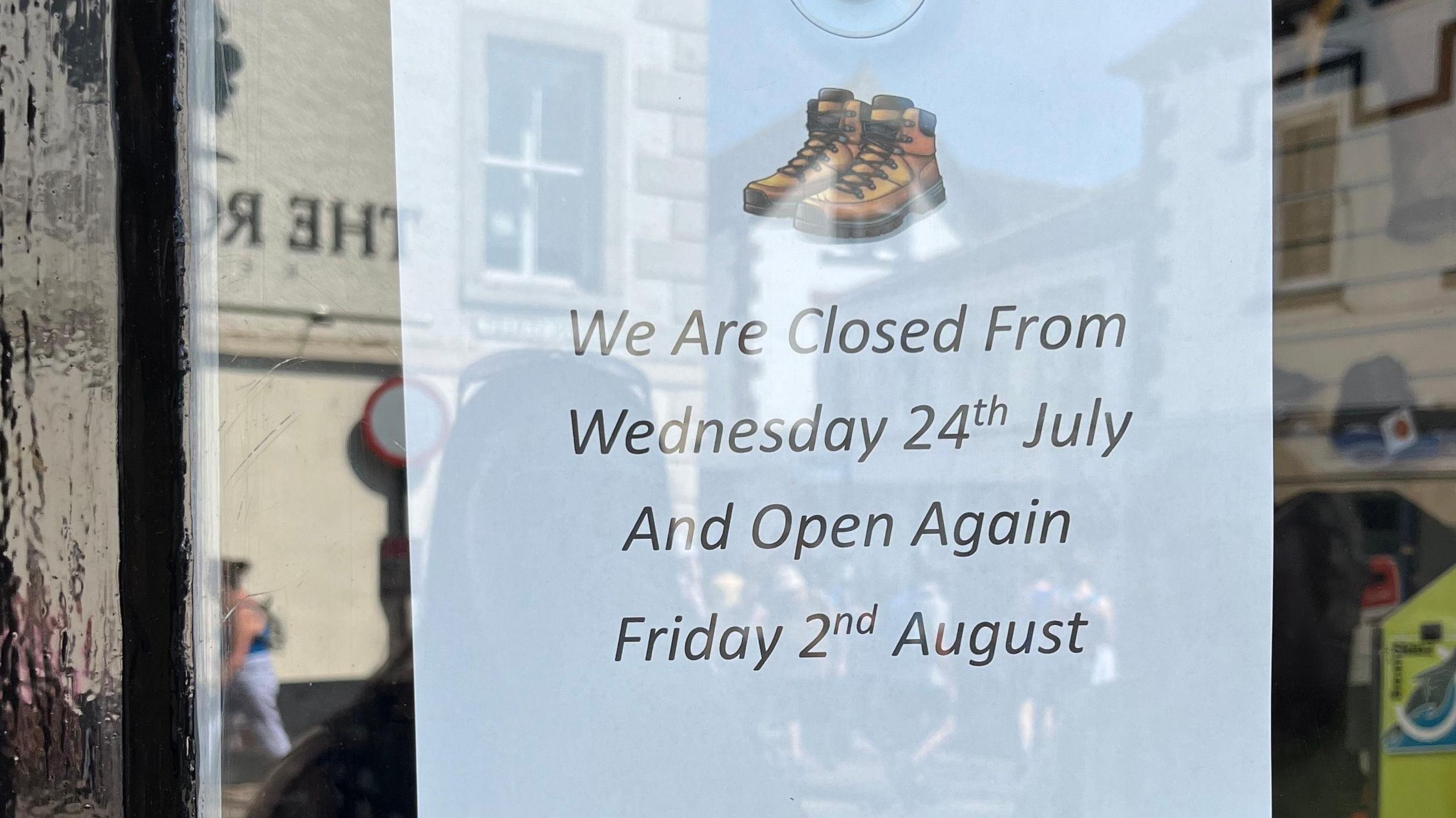
Viki Mallaghan says some businesses close during the convention as they make no money in this period
Many of the people the BBC spoke to agree it is an uncomfortable opinion to hold - no-one wants to be seen to be opposed to a religious convention taking place - but they say it would bring more benefit to the town outside the summer holidays.
However, Keswick Ministries says it has done lots for the town, including restoring the derelict Pencil Factory with £8m of donations raised from convention supporters.
The building, it says, is offered to community groups at discounted rates and is now a "major year-round conference centre," bringing people in out of the summer months.
Helen Macdonald works in a Keswick business and says she has mixed feelings about the convention.
"I get people who attend the convention here as clients and they're lovely. But I do feel it's the wrong time of year to have it for three weeks."
She says a lot of people from Keswick and surrounding areas keep out of town during the convention.
"It's because the car parking is a nightmare and because of the crowds," she adds.
'Extra money'
Keswick Tourism Association says it sits on the organising committee for the Christian convention, which gives it a chance to represent member businesses' views before and after the event.
Chairman Gary Lovatt says when issues have been raised with Keswick Ministries in the past about impact on trade, they have adapted their programming.
For instance, he says, there are no afternoon events, meaning people can visit shops, cafes and restaurants.
"We do have a diverse range of businesses that are members and there are differing views but, in general, there is no doubt that extra money is brought into the area by the convention," he says.
"Whether, if some of these people weren't here, we'd have other people who spend more, that is debatable."
However, he says 47% of all trade coming into Keswick is from day-trippers.
"A lot of members during these three weeks have adapted and changed working cycles," he said. "Restaurants, for instance, cater to early diners - the convention events start again at 19:00 in the evening, so they serve meals to them at 17:00 instead.
"There is a counter-argument to say you may get two bites of the cherry."
'Extreme messaging'
The convention, which ended last week, brought with it some "unwelcoming" attitudes too, residents say.
An anti-abortion organisation called Centre for Bio-Ethical Reform UK (CBR UK) displayed banners in the centre of town and approached people to talk about abortion.
Preachers using a megaphone also visited the town to spread their message, which residents said had anti-LGBTQ and misogynistic connotations.
They say they heard phrases including "a woman's place is in the home" and messaging to the effect that homosexuality was wrong.
When the anti-abortion banners are displayed, which show a living nine-week foetus in the womb, a group of residents stand in front of it with a sheet that reads "trigger warning," residents tell us.
Ms Mallaghan says she does not want day-trippers to get off the bus in Keswick and be baffled or upset by the sight.
"They aren't representing the message of how we want to be portrayed," she says.
"All year round we are welcoming, tolerant and peaceful people and this extreme messaging doesn't reflect how we want to be represented as a community."
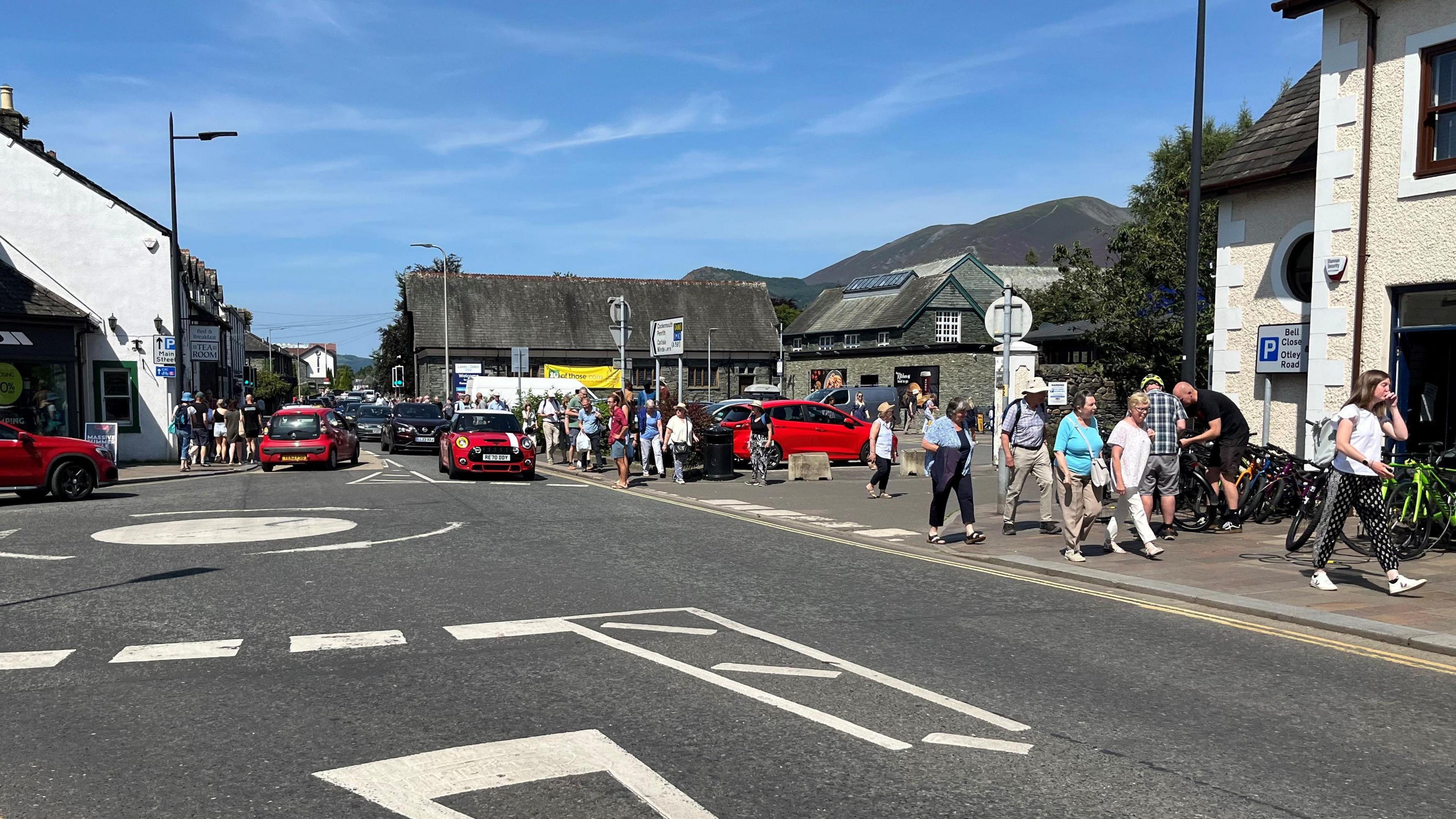
Businesses say with convention-goers filling the town there are intermittent surges in footfall before and after convention events
But CBR UK says its work is one of public education. It says those images, which can be seen in biology books, help the group to "humanise the babies who are being killed by abortion".
Residents also say they are being approached by the organisation's representatives, who hold small baby dolls and ask them questions about abortion.
CBR UK said: "We sometimes use life-sized models of 11-week foetuses which powerfully show the size of these tiny humans whom the abortion lobby refer to as 'products of conception'."
It added its educators are trained to use "Socratic methods" of asking people what they think about abortion and use scientific and philosophical arguments to make their point.
The use of the images and baby dolls, CBR UK said, challenged people's thinking around abortion and, while some changed their minds when challenged, others chose to cover up the images, as happened in Keswick.
Keswick Ministries said while it agreed with the core message that life began at conception, it distanced itself from the approach used by the group, which was not affiliated with them.
A spokesman said: "We are saddened by an approach which we believe is likely to disengage more people than it wins to this beautiful truth."
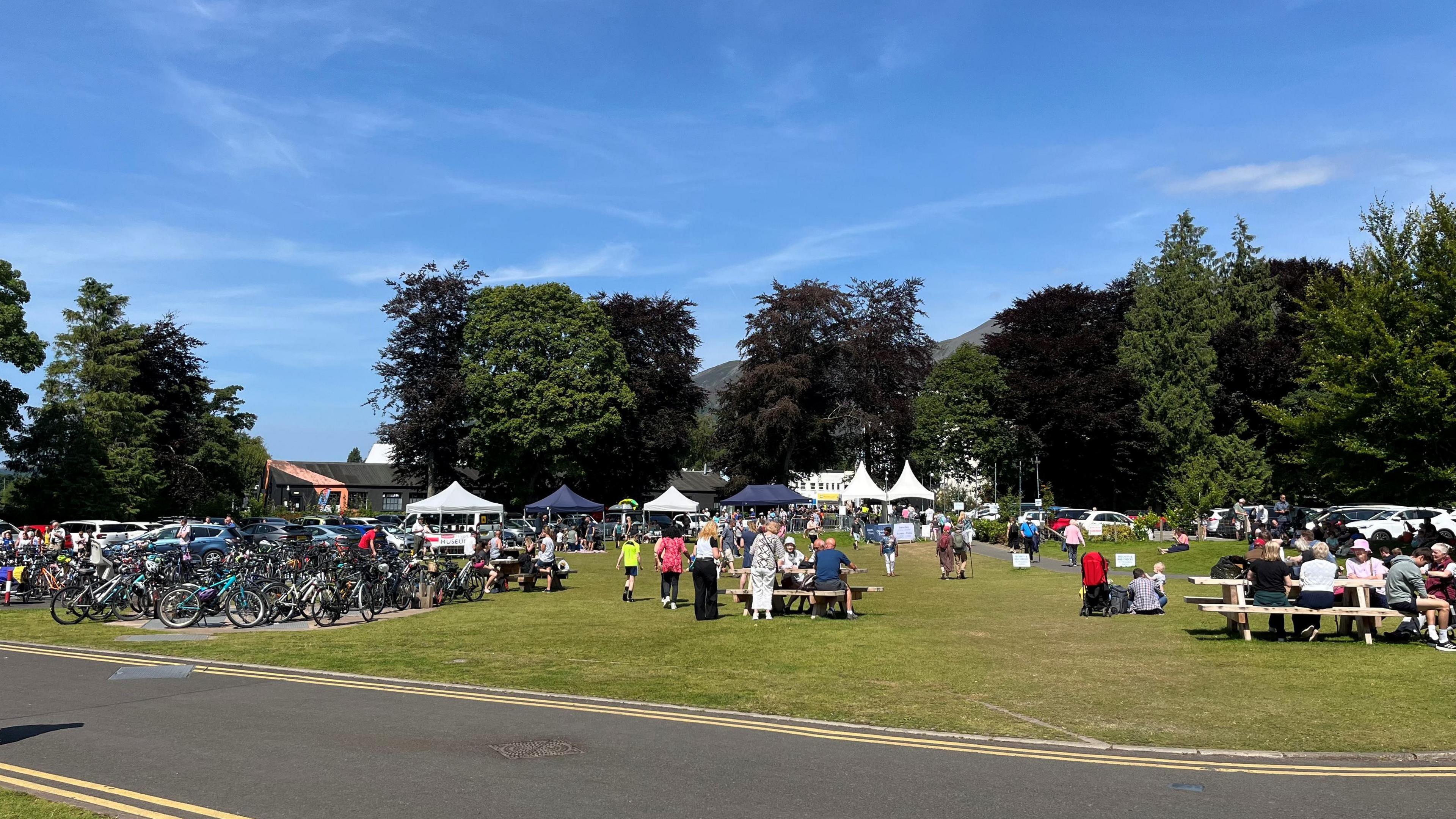
About 13,000 people attended the Christian convention in Keswick this year, organisers say
The spokesman added the preachers with the megaphone also had no link to them and said they were regular visitors to towns throughout the area, all year round.
Nearby cafe workers say, while convention-goers are a "pleasure to serve", when preachers are out with their megaphone people avoid using the outdoor seating and police are unable to move them on.
Terri Conroy, a resident who works in the town, says: "I have seen people coming down with drums and pans making noise to drown the sound out.
"The things [the preachers] say are offensive to most people."
Dale Mcalpine, of Grace Baptist Church in Workington, has preached during the convention.
He said his church members were "fully behind" the preaching of the gospel in Keswick.
"Christians must never apologise or be ashamed of the gospel or indeed any part of the bible, whether that is regarding the topic of human sexuality or a woman's role in the church," he adds.
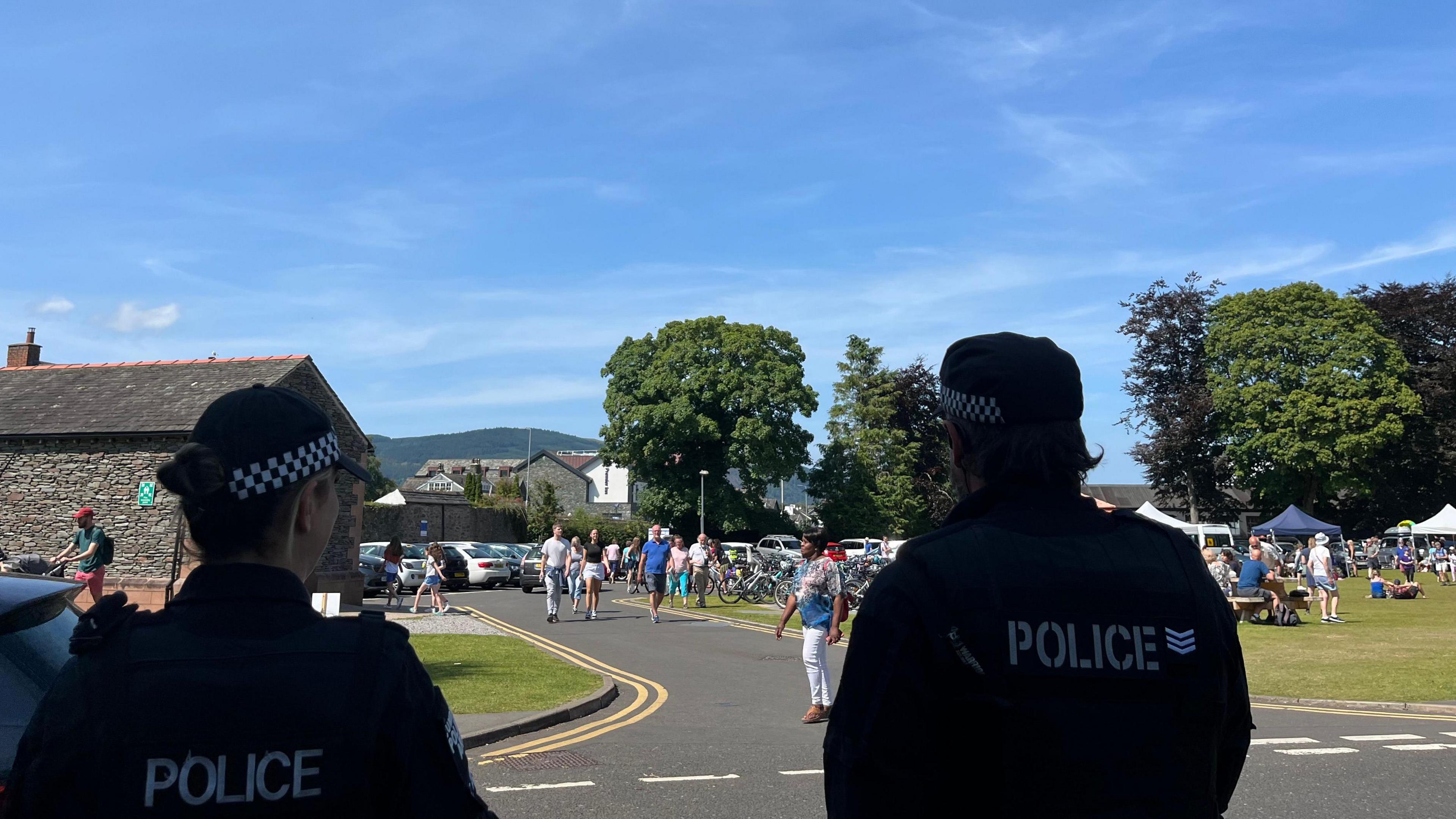
The convention takes place on the Pencil Factory site, which Keswick Ministries renovated
Cumbria Police said the force recognised individuals' rights to freedom of expression while also acknowledging the impact it may have.
A spokesman said: "Our response must be proportionate so that human rights freedoms are protected alongside safeguarding those members of the public affected."
The convention says it agrees with residents that everyone should feel welcome in Keswick.
A spokesman added: "This aligns with our vision as a ministry, the convention has been free to attend for 149 years, and anyone is welcome to come along, no matter their beliefs or background."
'Joyful' event
Convention attendees love coming to Keswick, they tell us when we approach them in town.
"We went for a cream tea down by the lake and it was beautiful down that area and we also plan on going on a walk," says Gareth Tides.
This is his third time in Keswick and this year he visited with his wife and two children.
He says that with events at the convention mostly taking place in the mornings and evenings, the afternoons are free for them to enjoy the area.
"It's been joyful, the weather has been really good and the children have been enjoying their groups," he adds.
The convention, he says, is a brilliant opportunity for people from "all walks of life" to come together to worship.
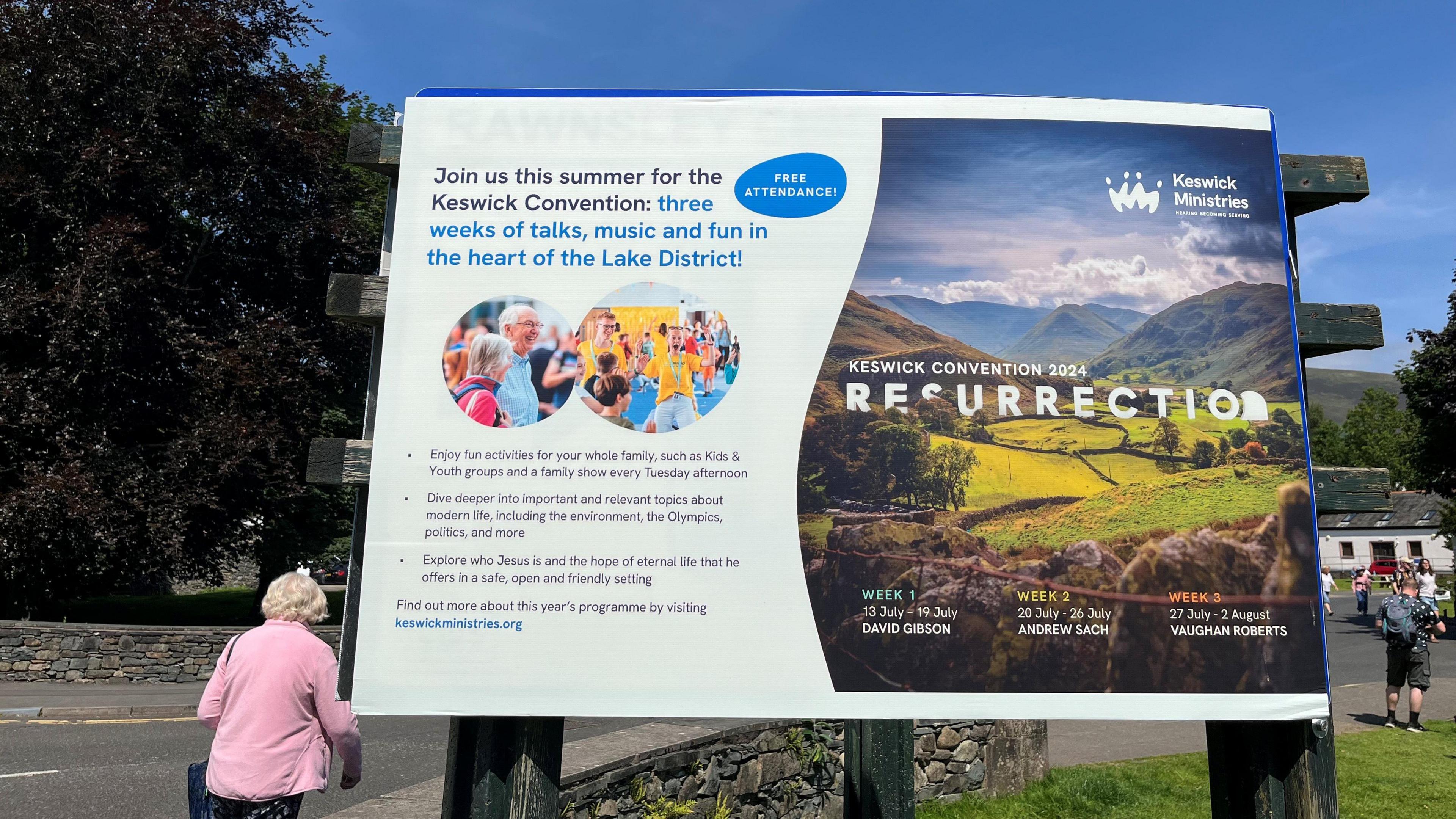
The Keswick Convention takes place over three weeks in the summer
Nate Morgan Locke came to the convention for the first time this year as a speaker from Keswick Unconventional – the event's programme of art and culture.
While he says he loved the event, he also found it a little "overwhelming".
"There's just lots of people to chat to and lots to talk about. But it is such a beautiful setting.
"For a lot of Christians when you mention Keswick they think about the convention, because it's been going for such a long time.
"It's very precious for many people because it's been in their lives for many years."
Keswick Ministries says it works with Keswick Tourism Association and hosts an independent website to encourage convention-goers to make the most of their time in the Lake District and support local businesses.
A spokesman added: "We greatly value our relationships with local businesses and suppliers.
"We work closely with a range of local businesses to provide catering, accommodation, production, maintenance and more both during the Convention and year-round."
Follow BBC Cumbria on X (formerly Twitter), external, Facebook, external and Instagram, external. Send your story ideas to northeastandcumbria@bbc.co.uk.
- Published4 February 2023
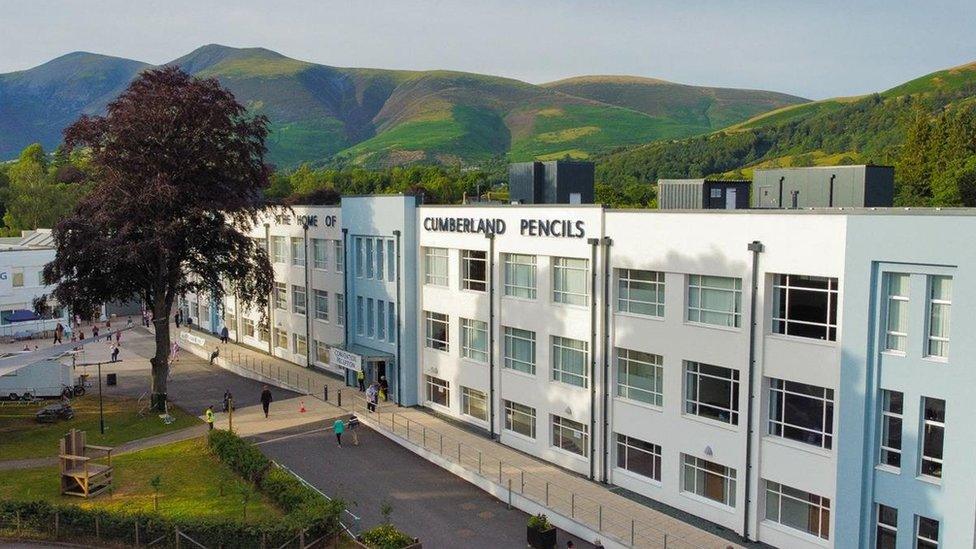
- Attribution